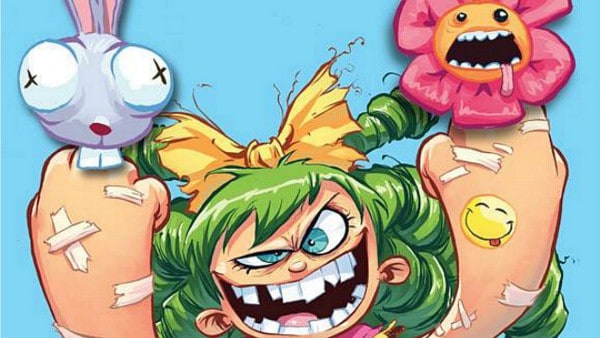
Story and art by Skottie Young
Color by Jean-Francois Beaulieu
Lettering by Nate Piekos
Logo and Design by Rian Hughes
Published by Image Comics
In last month’s issue, readers were introduced to Gertrude, a girl trapped in the magical world of Fairyland and searching for a way home. Unfortunately, years of being trapped in Fairyland has turned her psychotic and she goes on a killing spree. Queen Cloudia has sent out Bruud the Brual to bring back Gertrude’s head. Will Gertrude and her nihilistic companion, Larry the Fly, survive the encounter with Bruud or will their heads end up as mantelpieces in his trophy room?
The issue opens with a well-dressed mouse about to narrate the story of Gertrude, the moon narrator from the last episode having ended up as bloody chunks. He meets the same untimely fate when Gertrude crushes him with a beer mug. Gertrude managed to defeat Bruud the Brutal and talks drunkenly to his severed head about how much she hates Fairyland.
The blood and guts are as bountiful as ever, made more gruesome with the cutesy art. It is a wonderful subversion given Skottie Young’s past work like The Wizard of Oz and baby Marvel variants. One can’t help but feel the comic is a violent deconstruction, dumping on everything the artist has built his career on. Some might find it mindless, but there seems to be deeper meaning underneath the kitsch.
The most interesting character in I Hate Fairyland is Gertrude. On the surface, she is a typical psychopath, yet one finds psychological intrigue with a closer analysis. When Gertrude flirts with a frog prince, he runs away. Frustrated, Gertrude wishes to be normal for a day. Magic beer grants her wish, but years consuming Fairyland’s sugar-exclusive diet has turned her regular form into an enormous ball of diabetic tumors. Perhaps part of the reason Gertrude is psychotic is because of how it stole her life. Aside from drinking, she can’t enjoy adult activities like sex. Even if she escapes Fairyland, her body is deformed. Gertrude will never become a functioning adult, and this realization fills her with rage.
In issue 1, Gertrude’s transportation to Fairyland was shown to be a traumatic and painful experience. In this issue, she tells Larry everything she misses from her old life: friends, parents, and even asking directions. Fairyland is not a dream come true but a nightmare where she is separated from everyone she loves. Traumatized, lonely, and unable to age, Gertrude is a psychological mess that doesn’t know how to respond other than violence. If she can’t escape Fairyland, she will make it suffer as she does.
Gertrude is not the only corrupting force within the picturesque Fairyland, but the citizens themselves. Queen Cloudia, the beautiful, honorary ruler, sends out bounty hunters to eliminate the girl. Understandable, except the latest recruit, Horribella the Witch, poisons an entire town of fauns with a zombie virus. It seems that the good queen isn’t so good. With her, Horribella, and other crooked citizens, Fairyland has a lot of ugliness hidden underneath its fairy tale gloss (as all fairy tales tend to).
I Hate Fairyland is ripe with subversive material, not just violence. Skottie Young challenges the notion of magical escapism as something children would enjoy. In reality, it would be pretty terrible. If these subversive elements can be pushed further, the comic could be more nuanced while still being a bloody spectacle.
Given its spectacle driven nature, most of the characters aren’t deep yet are still enjoyable. The exception is Larry the Fly. Aside from some interesting dialogue, he mostly just comments on Gertrude’s present situation while staring sullenly. He is supposed to be the guide, yet doesn’t feel very active in guiding. This is the point given that he has become cynical, but why remain with Gertrude? His choice to guide her is voluntary; he may leave whenever. It might be that they are actually friends, but that feels like a cop out. Gertrude has no qualms with slaughtering the citizens of Fairyland, so why should Larry be any different? Hopefully, Young will further characterize Larry and approach his relationship with Gertrude that doesn’t feel cheap.
I Hate Fairyland has enjoyable mindless violence with potentially interesting subversive elements. Great art, fast-paced story, crude humor, and unique characters, makes for a satisfying read. Some might find the comic too mindless or some of the character flat, but for all the muffin huggers out there that love ultraviolence, it will be a sweet, delicious treat.



